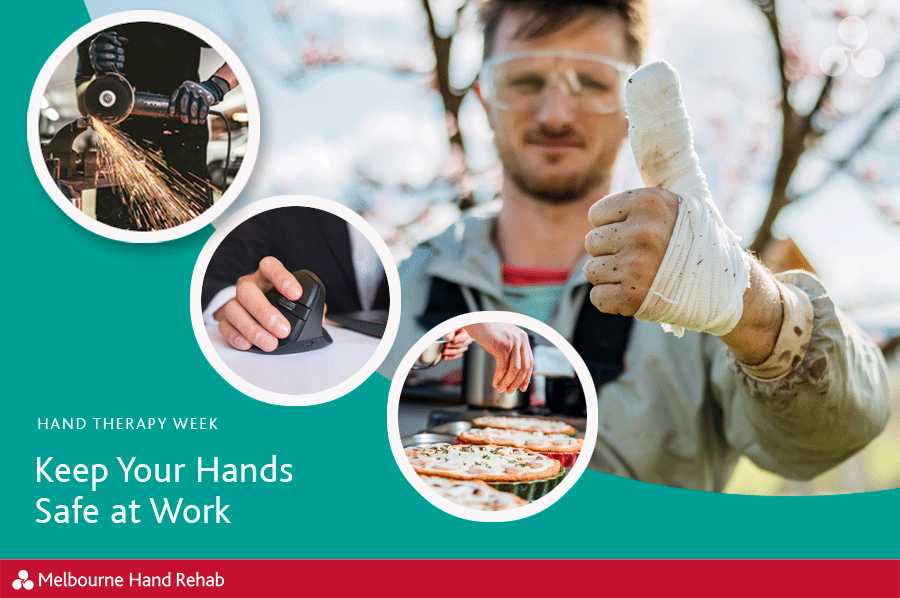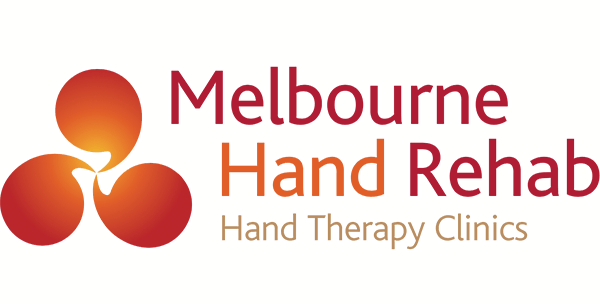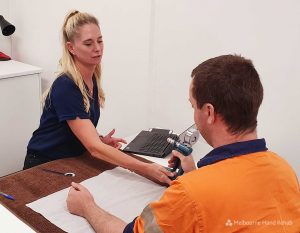
23 May Hand Therapy Week 2023
Did you know that finger and hand injuries are the most common type of work-related injury in Australia?
During Hand Therapy Week 2023 (Monday 5 – Sunday 11 June), the Australian Hand Therapy Association (AHTA) is highlighting the importance of Keeping Your Hands Safe At Work.
Optimal hand function is essential for good quality of life. When workplace injuries occur it is important to consult with an expert – a hand therapy practitioner is a physiotherapist or occupational therapist with expertise in the finger, hand, wrist, elbow, and shoulder.
Unfortunately, there is often a delay in individuals seeking treatment for work-related injuries – either through a desire to ‘push through the pain’ or a lack of knowledge of available services.
Our hand therapists are experienced in seeing broad range of individuals, from desk workers to manual labourers, from simple fractures to complex injuries. Regardless of the hand injury, it’s always important to seek help as early as possible.
Workplace injuries to the hand and upper limb can be caused by:
- poor hand ergonomics
- mechanical hazards
- environmental hazards
- skin irritants
Numerous factors contribute to hand, wrist, and finger injuries in the workplace. Repetitive motion tasks, such as typing or operating machinery, can lead to overuse injuries like carpal tunnel syndrome. Poor ergonomics, inadequate training, and failure to use personal protective equipment are also significant contributors. Additionally, slips, trips, and falls can cause fractures, dislocations, or soft tissue damage. Workplaces that deal with heavy machinery, tools, or hazardous materials pose an even greater risk of severe injuries to the hands, wrists, and fingers.
The most common type of hand injury requiring hospitalisation occurs when a worker’s hand is ‘exposed to inanimate mechanical forces’ – for example crushed or jammed, or contact with power tools, knives or machinery. This can cause severe bruising, broken bones, nerve damage, and even amputation.
Open wounds and fractures are the most common type of work related injury, but may not necessarily result in seeking treatment in a hospital emergency department.
“Using a sharp edged tool, operating powered plant or machinery which was not properly guarded, using a powered hand tool or appliance which was not properly guarded or which locked, and preparing food with an appliance or a knife, are the most common activities associated with injuries to the hand and wrist.”
Industries where these types of injuries commonly occur include:
- Hospitality (hot oil, food preparation and slicing equipment)
- Healthcare (needle stick injuries)
- Trades – agriculture and manufacturing (powered and un-powered hand tools and knives, loading/unloading activities, welding)
- Office and retail (cutting, slicing and sawing machinery)
Returning to work
In the event that you are injured at work, your Melbourne Hand Rehab hand therapist can also help with your return to work program. This may include conversations with your employer and conducting worksite assessments.
Prevention Measures
Preventing hand, wrist, and finger injuries requires a multifaceted approach. Employers should prioritise workplace safety by conducting thorough risk assessments and implementing appropriate control measures. This includes providing ergonomic workstations, ensuring machinery and tools are properly maintained, and promoting proper lifting techniques. Employers should also offer comprehensive training programs that educate workers about injury prevention, safe work practices, and the correct use of personal protective equipment.
Individual responsibility is equally important. Employees should actively participate in workplace safety programs, report hazards promptly, and follow established safety protocols. Regular breaks and stretching exercises can help alleviate strain caused by repetitive tasks. Employers and workers can collaborate to create a culture of safety, where open communication and feedback are encouraged.
If you are experiencing finger, hand or wrist pain, don’t hesitate to get in touch. We’d love to help you.
BOOK AN APPOINTMENT
For more information, call us directly on 03 9458 5166
You might also be interested in:
- Return to work after a hand injury
- Barista wrist injuries
- Tips for electricians to avoid hand injuries
- Common tradies injuries – how to minimise risk
- Tennis elbow but you don’t play tennis?
- Feeling sore at your desk? Here are 3 helpful stretches
- Ergonomic products for home or work





